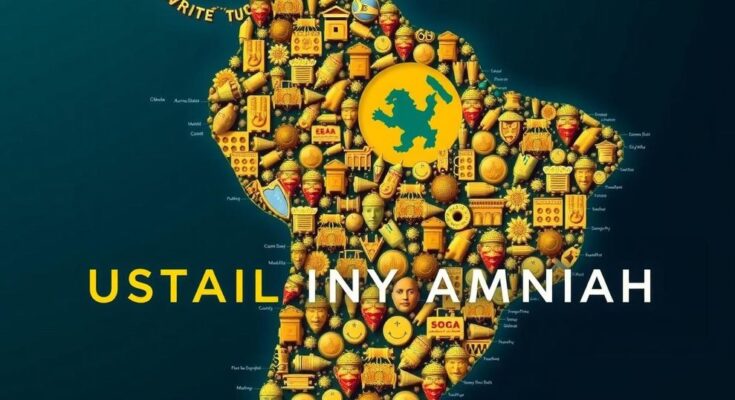Iran, alongside Hezbollah, has expanded its illicit operations across Latin America, particularly in the Triple Border region and other areas like Chile. Argentine officials have raised alarms regarding drug trafficking networks and potential terrorist activities linked to Hezbollah, emphasizing the necessity for regional intelligence cooperation to counter these threats.
Iran, in collaboration with its proxy group Hezbollah, has expanded its operational capacity through various illicit activities across strategic locations in Latin America, particularly in Bolivia, Brazil, Chile, Colombia, and Paraguay. Recent statements from Argentina’s Security Minister Patricia Bullrich highlighted Hezbollah’s presence in the Triple Border area, which encompasses Paraguay, Brazil, and Argentina, as well as in Chile’s Iquique region. Bullrich underscored the ongoing activities of the Barakat family in Chile, believed to facilitate financial and logistical support for Hezbollah. Fabián Calle, an International Relations professor at Argentina’s Austral University, noted the organization’s documented presence in Latin America since the 1990s, facilitated by Lebanese communities that emerged after the civil war in Lebanon. Emanuele Ottolenghi, a political scientist, confirmed the presence of Hezbollah in both Chile and Bolivia, linking it to the increasing drug trafficking networks in the region, which Hezbollah exploits for money laundering. Calle also reported that recent intelligence has revealed the proliferation of criminal networks in Bolivia and Chile associated with Hezbollah, indicating a systematic effort by Iran to bolster its influence in Latin America, seen as a strategically advantageous zone due to its proximity to the United States. In a related anecdote, a French publication, Le Point, suggested Hezbollah might be operating under the guise of a religious center in Bogotá, Colombia, utilizing it as a base for extending Iranian influence within the region. These activities include the leveraging of state gaps in areas with limited institutional governance, where Hezbollah might engage in smuggling and document forging, as well as orchestrating potential terrorist actions. Paraguayan President Santiago Peña indicated a decrease in terrorist operations in the Triple Border, attributing this improvement to enhanced capacities of intelligence agencies. Nevertheless, he emphasized the persistent threats posed by organized crime’s intersection with terrorism. Ely Karmon, a researcher at the Counter-Terrorism Institute, pointed out that Hezbollah’s operations are significantly tied to Lebanese Shiite communities distributed globally, especially within free trade areas in Latin America. Calle urged regional intelligence and security forces to enhance cooperation to combat drug trafficking and terrorism effectively, stating, “That Argentina has alerted Chile of the alleged operation of money movements linked to Hezbollah, is of utmost importance in the framework of regional cooperation.”
The presence of Iranian interests in South America, particularly through Hezbollah, has grown significantly over the years, primarily due to the region’s geopolitical landscape and the existence of Lebanese diaspora populations. The operational capacity of these groups relies on exploiting local vulnerabilities such as weak institutional frameworks and the flourishing drug trade. Concerns over Hezbollah’s activities have prompted security officials in countries like Argentina to take proactive measures to monitor and disrupt potential terrorist financing while collaborating with neighboring states to mitigate risks.
In conclusion, the growing influence of Iran and its proxy Hezbollah in South America poses significant challenges to regional security. The intertwining of organized crime and terrorist activities exacerbates these threats, necessitating a coordinated response from intelligence and law enforcement agencies throughout the region. Continuous vigilance is essential, as these developments not only endanger local stability but also have broader implications for international security.
Original Source: dialogo-americas.com




